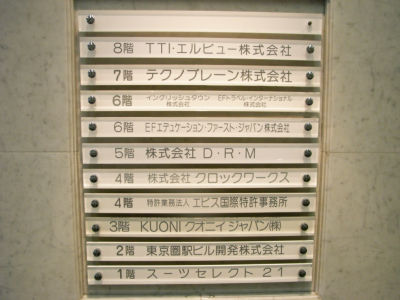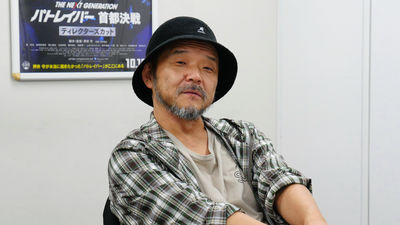Interview with producer Tsuneo Takechi of 'Clockworks', which distributes movies and sells goods, he owns 10,000 DVDs and an avalanche occurs in his room, but the situation cannot be confirmed

The number of
◆About Clockworks
The building that houses Clockworks. It's less than a 3-minute walk from Ebisu Station, making it very convenient for transportation.

The Clockworks office is on the 4th floor of the building.

GIGAZINE (hereinafter referred to as G):
First, I would like to ask you a few questions about the company. What kind of company is Clockworks?
Clockworks Tsuneo Takechi (hereinafter referred to as Takechi):
We started out as a rental video maker. They sell software to video rental stores, and then they buy movies that are not shown at theaters, such as V-cinema for Japanese movies or straight video for foreign movies, and sell them on video. .
G:
That's how it started.
Takechi:
The first film released was ``The Producer,'' starring Academy Award-winning actor Kevin Spacey. After that, I released a submarine movie called ``Steel Sharks,'' which won the Video of the Year award and sold quite well. In this way, we released titles little by little, and at first we focused on rental sales.
G:
I see.
Takechi:
After that, the scale of the productions gradually grew, and then we started distribution work. At that time, I was able to work on works such as ``CUBE,'' ``The Blair Witch Project,'' and ``Shaolin Soccer,'' and the company grew.
G:
There are many famous works.
Takechi:
Other popular works include ``Attack Number Half'', a Thai volleyball movie about a gay man, Korean horror movie ``Kal'', and a cute clay animation movie called ``Cheburashka''.
G:
I see, I'm curious as to what kind of work it is.
Takechi:
Regarding animation, we released the OVA of ``JoJo's Bizarre Adventure'' in 2000, and at the same time we decided to distribute ``Millennium Actress,'' and work began at that time.
G:
That's where the anime department started.
Takechi:
At the time, I was working at a company called Happinet, but ``JoJo's Bizarre Adventure'' led me to move to Clockworks. After that, he worked on many works such as ``The Melancholy of Haruhi Suzumiya'' and ``Full Metal Panic!'', and is currently in charge of rental work for ``Lucky Star'', ``Minamike'', and ``Bamboo Blade'' within the production committee. doing. By the way, our main works are the TV anime ``MOONLIGHT MILE'' broadcast on WOWOW and the theatrical animation ``JoJo's Bizarre Adventure Phantom Blood'' released on February 17th of this year.
G:
When I compiled the list of anime that started airing in October 2007 , 'MOONLIGHT MILE' was at the top of the list when it started airing on September 13th, which left an impression on me.
Takechi:
Due to this trend, we are currently distributing ` `Evangelion: New Theatrical Version: Introduction .''
G:
I see. The live-action and animation departments operate separately.
Takechi:
Yes, the company is made up of both axes.
◆The man with 10,000 DVDs
G:
I heard that you own about 10,000 DVDs, is that true?
Takechi:
To be precise...I actually don't understand it. I have always loved videos and have a habit of collecting them, so I ended up collecting them. When I was in high school, LD software started to be released, and since I was still a student at the time, I could hardly buy it, and I remember vowing to myself as a student that I would collect as much as I could when I became an adult.
G:
I see.
Takechi:
After graduating from university, I got a job at a video software distribution company called Happinet (then Beam Entertainment) and was assigned to sales, and that's when I started collecting DVDs. This was in 1997, and DVDs were just starting to come out. At that time, only a few companies such as Warner for Western movies and HMP for adult movies were releasing DVDs, so collecting them was easy. Since I was a salesman, I had a lot of samples for sales, so I would receive some of the leftovers. After that, I moved to the production department, and at that time, I bought products from other rival manufacturers to use as reference for packaging, and the number of products I produced increased rapidly.
G:
method.
Takechi:
Then, the era became the heyday of DVD-BOX, and I personally bought as many DVD-BOX as I could, including Western TV drama series boxes such as Star Trek BOX and Juzo Itami BOX.
G:
I don't even know the exact number myself.
Takechi:
I agree. It's not just on the shelves, it's piled up on the floor of my room, and I don't even know what's at the bottom. The other day, when I went home after buying a DVD at a wagon sale, I was stunned to find that it was already on the shelf.
G:
With so many DVDs, do you have time to look at them properly?
Takechi:
To be honest, I'm saving the contents for fun in my old age (lol). I watch the works I'm interested in, but the reality is that I'm so busy with work that I haven't been able to keep up with them. However, I always make sure to check the binding of the package, and I also watch the first episode. However, if it's a series, volumes 2 and onwards may be unopened...
G:
By the way, how much do you buy every month?
Takechi:
At its peak, I was buying about 100,000 yen a month. Especially in the early days of DVDs, there were only a small number of products released each month, so I guess I bought about 80% of them.
G:
80%!
Takechi:
After that, cheaper versions started to come out on sale, and I started to think it was ridiculous, so I hardly ever buy it anymore. I mean, even if you buy a box that costs 50,000 yen or 100,000 yen each, six months later it's half that price, and the next year it's half that price again, which is so terrible (angry).
G:
It's helpful for people who are hesitant about buying one.
Takechi:
If you buy it and it's 1/4 in a year, it depends on the stock price. So, now I'm buying it every now and then when it's released and it's cheap. Also, since I have almost everything I want, I don't have much left to buy (lol).
G:
I see, it's the result of an adult purchase.
Takechi:
For example, we have almost all the DVDs of major Hollywood movies like Spielberg's movies and Star Wars.
G:
It looks like a rental shop will open.
Takechi:
It looks like you can make money at a rental shop. Maybe I should rent it to someone who lives in the same apartment.
G:
People living in the same apartment building will also be helpful.
Takechi:
I'm not bragging, but when it first started out, there were only Happinet, Warner Home Video, a few adult companies, and a few music companies, and there were only about a few dozen titles a month, so I was able to collect them all. I had all of Bandai Visual's famous anime series, and for the first three years I think I had the most in Japan. Since then, the number of DVD titles released each month has increased rapidly, and I can't keep up with my collection.
G:
It's true that there are so many titles released each month that it's hard to know which one to buy.
Takechi:
Approximately 150 anime titles are released each month, about 100 foreign movies, and a little less Japanese movies. I can't catch up with that.
G:
When you look up the anime that is currently being broadcast, you will be surprised at how much it will cost if all of them are released on DVD. It may be a good thing for people in areas where there is no broadcasting because the DVD will definitely be available.
Takechi:
But now we can just watch it on YouTube or the web, so the world has become a better place.
G:
After all, people who are particular about image quality and fans of the work will buy it.
Takechi:
It's good because you can watch it on YouTube or Nico Nico Douga first and then buy the DVD later. In the past, you couldn't see what was inside, so I bought it and was fooled! That's the kind of world it was.
G:
That's also true, isn't it?
Takechi:
In the past, that was fine, but now there are so many works that it's hard to keep track of them.You can buy foreign movies for about 3,000 yen, but anime is expensive, and limited editions cost about 10,000 yen. What is it like to be working on an anime work myself? I think even people who can spend a lot of money a month spend around 30,000 yen. Also, everyone's room should be filling up by now (lol)
G:
I see, storing DVDs is difficult.
Takechi:
I think it would be even more difficult to collect if there were different sizes of cases. In the past, I used to buy limited editions a lot, but lately I've been thinking about whether the regular edition would be okay or whether a thinner case would be better. Previously, I felt that the big, bulky ones were more profitable than the thin ones, but now the thin ones are better.
G:
The thinner the storage, the better.
Takechi:
Alien head statues, Star Trek BOX plastic case series, and other old DVD-BOX series take up a lot of space.
G:
What does your house look like?
Takechi:
Right now, my room is 8 tatami mats in size, and when I enter, there are 4 steel racks against the wall, each with 2 rows of DVDs, and each shelf has about 8 or 9 tiers. As if that wasn't enough, on the other side of the room there is one of the same items and a shelf that can hold about 1000 CDs. Moreover, there are piles of video tapes behind it.
G:
Is there a video too?
Takechi:
I can't get rid of all the VHS I haven't watched, and I've put it on the shelf in front of the video, so I can't move it. I try to throw away the VHS once the DVD comes out. In the beginning, VHS came out, then LD came out, and then DVD came out a long time later, so I had the VHS first and replaced it when the DVD came out. There is also a pile of items that have not been released on DVD but only on VHS.
G:
I guess the things behind the steel rack can't be taken out anymore...?
Takechi:
I can't bring it out. There was an avalanche in the room the other day. I heard a loud noise and went to check the room, but even after looking at it, I couldn't really tell what condition it was in, so I left it as it was...it must have collapsed. I don't have time so I haven't checked it yet. I currently have a large 47-inch TV placed in front of that shelf, so I can't tell unless I move the TV.
◆Basic work schedule
G:
What is your usual work schedule like?
Takechi:
I usually try to get to work between 10am and 11am. I'm currently making a TV animation work, so I have to work in the studio every week, and I'm in the studio three times a week for dubbing, dubbing, and video editing. I'm involved in 5 productions that are currently on air, so that means I'll be in the studio 15 times a week, maxing out 5x3. However, of course I can't do everything, so I focus on the tasks that I have to do. Editing work for a certain work starts at midnight, finishes around 6am, and then delivers the work to the TV station.
G:
I see, it's difficult...
Takechi:
Other than that, I have meetings about projects, events, and promotions, and I also have to check DVD package jacket designs and magazine articles.Afterwards, I go out for drinks for entertainment, so I get home around 11:00 p.m. I often do.
◆Usual meals etc.
G:
It seems like you move around a lot, but where do you usually eat lunch?
Takechi:
I only take it around the office about once a week. I'm often in Shinjuku, the center of the anime industry, rather than Ebisu. My recommendation in Ebisu is an Italian restaurant near my company. There may be a treasured My Gourmet file that collects business cards of delicious restaurants.
G:
Oh, that sounds convenient.
◆ Amazing stories about legendary episodes and work
G:
Do you have any legendary or amazing stories that you came across while doing your job?
Takechi:
There are many things... The most amazing story I heard on a TV show was that they delivered the master tape to the station one minute before it went on air.
G:
Wow...that's an incredible story.
Takechi:
As for me, I've recently been traveling overseas every month this year. Of course, I went there not only for private purposes, but also for work. People around me scolded me and told me to work instead of being envious (lol).
G:
That is (lol)
◆Company PR
Takechi:
' Little Red: Who's the Recipe Thief? ' is being shown nationwide from October 6th (Saturday), and the cast includes famous actors and comedians, so please come and see it.
◆Future policy
Takechi:
We will continue to increase the number of works we are involved in producing, regardless of whether they are Western movies, Japanese movies, or anime. I'm trying to be involved from the planning stage as much as possible. When it comes to animation, I want to create original works as well as original works. I think it would be great if I could create high-quality, highly entertaining works.
G:
Thank you very much.
◆Editor's postscript
When we interviewed him in September, the second season of ` `MOONLIGHT MILE '', which Clockworks is involved with, was about to start, and even though it was a very busy time, he kindly agreed to the interview. As expected, he is a busy person, so he doesn't have time to sit back and watch DVDs right now. I thought I was jealous of the large amount of DVDs available, but things don't go so well...
The latest work distributed by Clockworks is `` Hitler's Counterfeit ''. The film is based on Adolf Bulger's `` Hitler's Counterfeit: The Devil's Workshop'' and directed by Stefan Luzovici. Starring Karl Markovics, August Diehl, and David Strizoff. It will be released nationwide from Saturday, January 19, 2008.
KLOCKWORX Co., Ltd. - THE KLOCKWORX
https://klockworx.com/
Related Posts:







